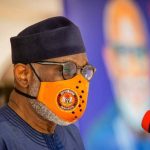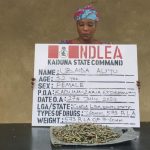As the global economic community strives to close the gap of inequality among countries, the International Monetary Fund (IMF) has, once more, reminded leaders of the need to fight against poverty by offering necessary measures to stem the menace. In a blog released over the weekend by the Managing Director of IMF, Kristalina Georgieva, she said the Bretton Woods institution was already reviewing concessional lending instrument for developing countries, which include Nigeria.
Advising that fiscal policies must be people-focused, she stressed that “we must do more to ensure that fiscal policies support the most vul- nerable members of society. “The challenge is that many economies are facing severe fiscal pressures. In developing countries, debt-servicing costs are taking up a bigger share of tax revenue at a time when they are tackling a growing list of spending demands, from investments in infrastructure to the cost of adapting to climate change.
“A gradual and people-focused fiscal effort can alleviate fiscal risks while limiting any negative impact on growth and inequality, includ- ing by raising revenue, improving governance, and protecting social programmes. “There is much scope for devel- oping countries to raise more revenue through tax reforms—as much as nine per cent of GDP, according to our research. Yet it is crucial to take a progressive approach, which means making sure those who can afford to pay more taxes contribute their fair share.
Taxing capital income and property, for example, offer a relatively progressive way to raise more tax revenue. She also said that regardless of the strategy, people needed to have confidence that the taxes they pay will be used to deliver public services—not enrich those in power, adding that governance improve- ments, such as to increase transparency and reduce corruption, must also be part of the equation. “At the same time, social-spending programmes can make a big difference to inequality, including through school meals, unemployment insurance, and pensions.
These should be protected. Well- targeted cash-transfer programs— such as Brazil’s Bolsa Familia— can support the vulnerable. “Our research shows that strong redistributive policies in a growing G20 economy—such as social- spending programs and public investment in education—can reduce inequality between 1.5 and five times more than weaker policies.”
She also harped on the need for a strong global financial safety net for countries that need support, saying with that goal in mind, the IMF was working on a package of reforms to our lending framework. According to her, “to continue to serve the needs of our most vulnerable members, we are reviewing our concessional lending instrument for low-income countries, the Poverty Reduction and Growth Trust.
With demand expected to exceed pre-pandemic levels, it is vital that our membership comes together to ensure the PRGT is adequately resourced and its long-term finances are put on a sustainable footing. “We are also taking a close look at our surcharge policy for the first time in nearly a decade. The review aims to ensure we can continue to provide financing at affordable rates to members who need our support.” The IMF chief also noted that long periods of slow eco- nomic growth could cause a jump in inequality, adding that a balanced set of policies could, however, stave off that outcome.
She observed that the global economy was stuck in low gear, which could deal a major blow to the fight against poverty and inequality. According to her, “Group of Twenty finance ministers and central-bank governors gathering this week in Rio de Janeiro face a sobering outlook. “As the IMF’s latest World Economic Outlook update shows, global growth is expected to reach 3.2 per cent this year and 3.3 per cent in 2025, well below the 3.8 percent average from the turn of the century until the pandemic.
Meanwhile, our medium-term growth projections continue to languish at their lowest in de- cades. “To be sure, the global econ- omy has shown encouraging resilience to a succession of shocks. The world didn’t slip into recession, as some predicted when central banks around the world raised interest rates to contain inflation.
“Yet, as we move beyond the crisis years of the pandemic, we need to prevent the world from falling into a prolonged period of anemic growth that entrenches poverty and inequality.” The managing director said the pandemic already set back the fight as extreme pov- erty increased after decades of decline, while global hun- ger surged and the long-term decline in inequality across countries stalled.









I haven’t checked in here for some time since I thought it was getting boring, but the last several posts are great quality so I guess I’ll add you back to my everyday bloglist. You deserve it my friend 🙂
Hmm it appears like your website ate my first comment (it was extremely long) so I guess I’ll just sum it up what I had written and say, I’m thoroughly enjoying your blog. I too am an aspiring blog blogger but I’m still new to the whole thing. Do you have any tips for rookie blog writers? I’d certainly appreciate it.
There is evidently a bunch to realize about this. I believe you made some nice points in features also.